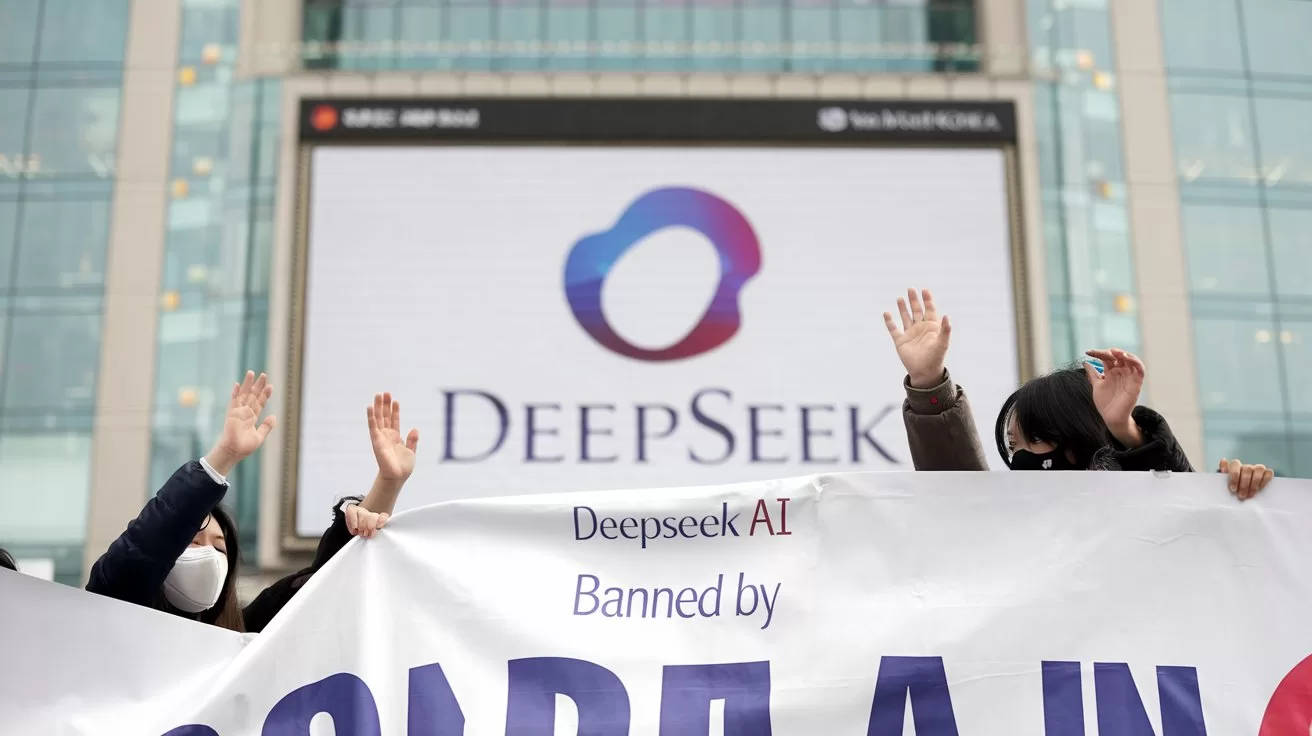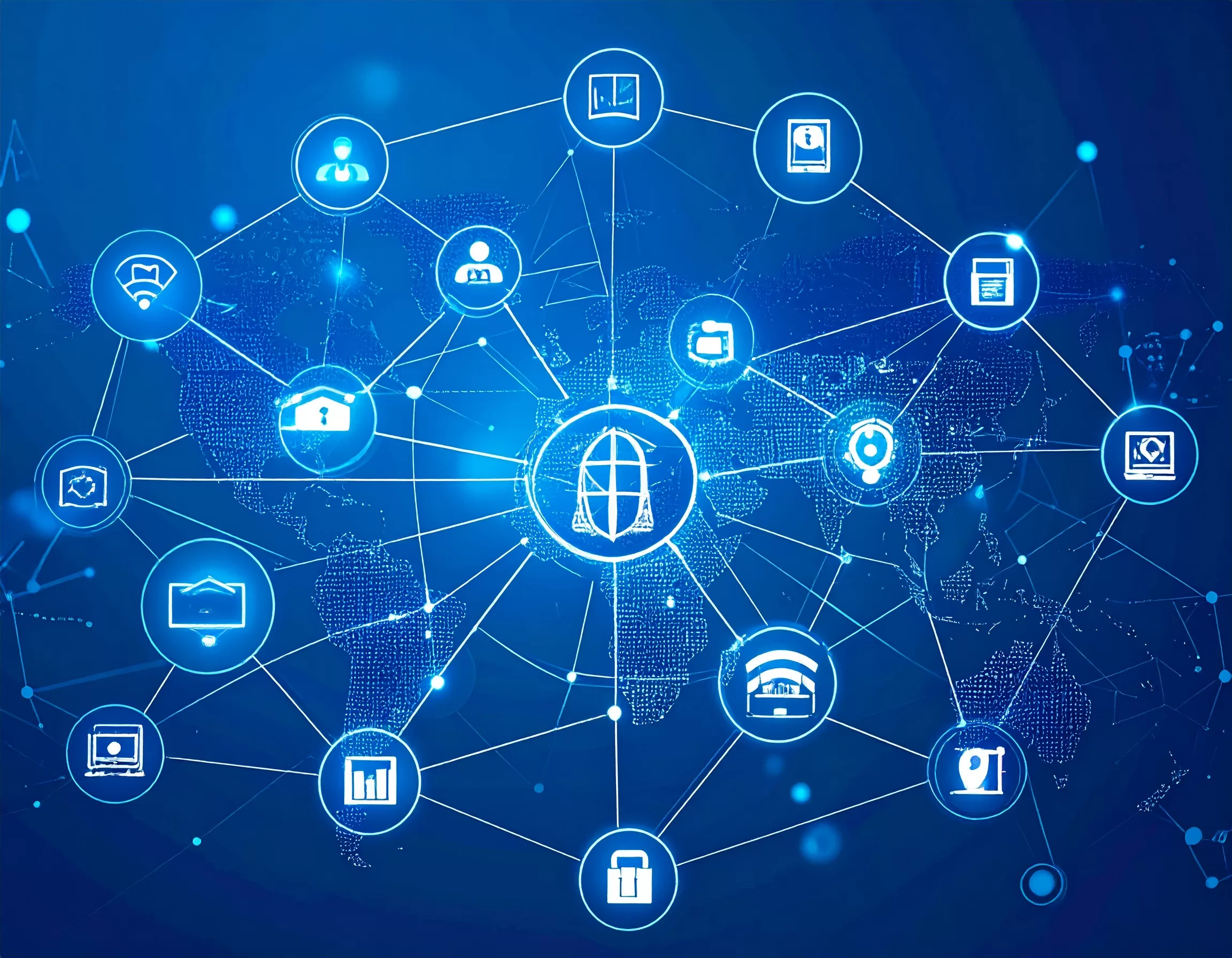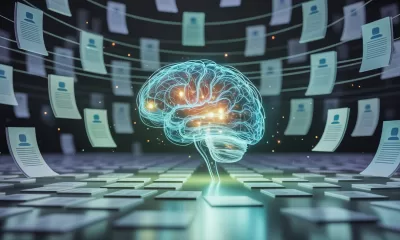News
DeepSeek Dilemma: AI Ambitions Collide with South Korean Privacy Safeguards
South Korea blocks new downloads of China’s DeepSeek AI app over data privacy concerns, highlighting Asia’s newer scrutiny of AI innovators.
Published
3 months agoon
By
AIinAsia
TL;DR – What You Need to Know in 30 Seconds
- DeepSeek Blocked: South Korea’s PIPC temporarily halted new downloads of DeepSeek’s AI app over data privacy concerns.
- Data to ByteDance: The Chinese lab reportedly transferred user data to ByteDance, triggering regulatory alarm bells.
- Existing Users: Current DeepSeek users in South Korea can still access the service, but are advised not to input personal info.
- Global Caution: Australia, Italy, and Taiwan have also taken steps to block or limit DeepSeek usage on security grounds.
- Founders & Ambitions: DeepSeek (founded by Liang Feng in 2023) aims to rival ChatGPT with its open-source AI model.
- Future Uncertain: DeepSeek needs to comply with South Korean privacy laws to lift the ban, raising questions about trust and tech governance in Asia.
DeepSeek AI Privacy in South Korea—What Do We Already Know?
Regulators in Asia are flexing their muscles to ensure compliance with data protection laws. The most recent scuffle? South Korea’s Personal Information Protection Commission (PIPC) has temporarily restricted the Chinese AI Lab DeepSeek’s flagship app from being downloaded locally, citing—surprise, surprise—privacy concerns. This entire saga underscores how swiftly governments are moving to keep a watchful eye on foreign AI services and the data that’s whizzing back and forth in the background.
So, pop the kettle on, and let’s dig into everything you need to know about DeepSeek, the backlash it’s received, the bigger picture for AI regulation in Asia, and why ByteDance keeps cropping up in headlines yet again. Buckle up for an in-depth look at how the lines between innovation, privacy, and geopolitics continue to blur.
1. A Quick Glimpse: The DeepSeek Origin Story
DeepSeek is a Chinese AI lab based in the vibrant city of Hangzhou, renowned as a hotbed for tech innovation. Founded by Liang Feng in 2023, this up-and-coming outfit entered the AI race by releasing DeepSeek R1, a free, open-source reasoning AI model that aspires to give OpenAI’s ChatGPT a run for its money. Yes, you read that correctly—they want to go toe-to-toe with the big boys, and they’re doing so by handing out a publicly accessible, open-source alternative. That’s certainly one way to make headlines.
But the real whirlwind started the moment DeepSeek decided to launch its chatbot service in various global markets, including South Korea. AI enthusiasts across the peninsula, always keen on exploring new and exciting digital experiences, jumped at the chance to test DeepSeek’s capabilities. After all, ChatGPT had set the bar high for AI-driven conversation, but more competition is typically a good thing—right?
2. The Dramatic Debut in South Korea
South Korea is famous for its ultra-connected society, blazing internet speeds, and fervent tech-savvy populace. New AI applications that enter the market usually either get a hero’s welcome or run into a brick wall of caution. DeepSeek managed both: its release in late January saw a flurry of downloads from curious users, but also raised eyebrows at regulatory agencies.
If you’re scratching your head wondering what exactly happened, here’s the gist: The Personal Information Protection Commission (PIPC), the country’s data protection watchdog, requested information from DeepSeek about how it collects and processes personal data. It didn’t take long for the PIPC to raise multiple red flags. As part of the evaluation, the PIPC discovered that DeepSeek had shared South Korean user data with none other than ByteDance, the parent company of TikTok. Now, ByteDance, by virtue of its global reach and Chinese roots, has often been in the crosshairs of governments worldwide. So, it’s safe to say that linking up with ByteDance in any form can ring alarm bells for data regulators.
3. PIPC’s Temporary Restriction: “Hold on, Not So Fast!”
Citing concerns about the app’s data collection and handling practices, the PIPC advised that DeepSeek should be temporarily blocked from local app stores. This doesn’t mean that if you’re an existing DeepSeek user, your app just disappears into thin air. The existing service, whether on mobile or web, still operates. But if you’re a brand-new user in South Korea hoping to download DeepSeek, you’ll be greeted by a big, fat “Not Available” message until further notice.
The PIPC also took the extra step of recommending that current DeepSeek users in South Korea refrain from typing any personal information into the chatbot until the final decision is made. “Better safe than sorry” seems to be the approach, or in simpler terms: They’re telling users to put that personal data on lockdown until DeepSeek can prove it’s abiding by Korean privacy laws.
All in all, this is a short-term measure meant to urge DeepSeek to comply with local regulations. According to the PIPC, downloads will be allowed again once the Chinese AI lab agrees to play by South Korea’s rulebook.
4. “I Didn’t Know!”: DeepSeek’s Response
In the aftermath of the announcement, DeepSeek appointed a local representative in South Korea—ostensibly to show sincerity, cooperation, and a readiness to comply. In a somewhat candid admission, DeepSeek said it had not been fully aware of the complexities of South Korea’s privacy laws. This statement has left many scratching their heads, especially given how data privacy is front-page news these days.
Still, DeepSeek has assured regulators and the public alike that it will collaborate closely to ensure compliance. No timelines were given, but observers say the best guess is “sooner rather than later,” considering the potential user base and the importance of the South Korean market for an ambitious AI project looking to go global.
5. The ByteDance Factor: Why the Alarm?
ByteDance is something of a boogeyman in certain jurisdictions, particularly because of its relationship with TikTok. Officials in several countries have expressed worries about personal data being funnelled to Chinese government agencies. Whether that’s a fair assessment is still up for debate, but it’s enough to create a PR nightmare for any AI or tech firm found to be sending data to ByteDance—especially if it’s doing so without crystal-clear transparency or compliance with local laws.
Now, we know from the PIPC’s investigation that DeepSeek had indeed transferred user data of South Korean users to ByteDance. We don’t know the precise nature of this data, nor do we know the volume. But for regulators, transferring data overseas—especially to a Chinese entity—raises the stakes concerning privacy, national security, and potential espionage risks. In other words, even the possibility that personal data could be misused is enough to make governments jump into action.
6. The Wider Trend: Governments Taking a Stand
South Korea is hardly the first to slam the door on DeepSeek. Other countries and government agencies have also expressed wariness about the AI newcomer:
- Australia: Has outright prohibited the use of DeepSeek on government devices, citing security concerns. This effectively follows the same logic that some governments have used to ban TikTok on official devices.
- Italy: The Garante (Italy’s data protection authority) went so far as to instruct DeepSeek to block its chatbot in the entire country. Talk about a strong stance!
- Taiwan: The government there has banned its departments from using DeepSeek’s AI solutions, presumably for similar security and privacy reasons.
But let’s not forget: For every country that shuts the door, there might be another that throws it wide open, because AI can be massively beneficial if harnessed correctly. Innovation rarely comes without a few bumps in the road, after all.
7. The Ministry of Trade, Energy, & More: Local Pushback from South Korea
Interestingly, not only did the PIPC step in, but South Korea’s Ministry of Trade, Industry and Energy, local police, and a state-run firm called Korea Hydro & Nuclear Power also blocked access to DeepSeek on official devices. You’ve got to admit, that’s a pretty heavyweight line-up of cautionary folks. If the overarching sentiment is “No way, not on our machines,” it suggests the apprehension is beyond your average “We’re worried about data theft.” These are critical agencies, dealing with trade secrets, nuclear power plants, and policing—so you can only imagine the caution that’s exercised when it comes to sensitive data possibly leaking out to a foreign AI platform.
The move mirrors the steps taken in other countries that have regulated or banned the use of certain foreign-based applications on official devices—especially anything that can transmit data externally. Safety first, and all that.
8. Privacy, Data Sovereignty, and the AI Frontier
Banning or restricting an AI app is never merely about code and servers. At the heart of all this is a debate around data sovereignty, national security, and ethical AI development. Privacy laws vary from one country to another, making it a veritable labyrinth for a new AI startup to navigate. China and the West have different ways of regulating data. As a result, an AI model that’s legally kosher in Hangzhou could be a breach waiting to happen in Seoul.
On top of that, data is the new oil, as they say, and user data is the critical feedstock for AI models. The more data you can gather, the more intelligent your system becomes. But this only works if your data pipeline is in line with local and international regulations (think GDPR in Europe, PIPA in South Korea, etc.). Step out of line, and you could be staring at multi-million-dollar fines, or worse—an outright ban.
9. The Competition with ChatGPT: A Deeper AI Context
DeepSeek’s R1 model markets itself as a competitor to OpenAI’s ChatGPT. ChatGPT, as we know, has garnered immense popularity worldwide, with millions of users employing it for everything from drafting emails to building software prototypes. If you want to get your AI chatbot on the global map these days, you’ve got to go head-to-head with ChatGPT (or at least position yourself as a worthy alternative).
But offering a direct rival to ChatGPT is no small task. You need top-tier language processing capabilities, a robust training dataset, a slick user interface, and a good measure of trust from your user base. The trust bit is where DeepSeek appears to have stumbled. Even if the technical wizardry behind R1 is top-notch, privacy missteps can overshadow any leaps in technology. The question is: Will DeepSeek be able to recover from this reputational bump and prove itself as a serious contender? Or will it end up as a cautionary tale for every AI startup thinking of going global?
10. AI Regulation in Asia: The New Normal?
For quite some time, Asia has been a buzzing hub of AI innovation. China, in particular, has a thriving AI ecosystem with a never-ending stream of startups. Singapore, Japan, and South Korea are also major players, each with its own unique approach to AI governance.
In South Korea specifically, personal data regulations have become tighter to keep pace with the lightning-fast digital transformation. The involvement of the PIPC in such a high-profile case sends a clear message: If you’re going to operate in our market, you’d better read our laws thoroughly. Ignorance is no longer a valid excuse.
We’re likely to see more of these regulatory tussles as AI services cross borders at the click of a mouse. With the AI arms race heating up, each country is attempting to carve out a space for domestic innovators while safeguarding the privacy of citizens. And as AI becomes more advanced—incorporating images, voice data, geolocation info, and more—expect these tensions to multiply. The cynics might say it’s all about protecting local industry, but the bigger question is: How do we strike the right balance between fostering innovation and ensuring data security?
11. The Geopolitical Undercurrents
Yes, this is partly about AI. But it’s also about politics, pure and simple. Relations between China and many Western or Western-aligned nations have been somewhat frosty. Every technology that emerges from China is now subject to intense scrutiny. This phenomenon isn’t limited to AI. We saw it with Huawei and 5G infrastructure. We’ve seen it with ByteDance and TikTok. We’re now witnessing it with DeepSeek.
From one perspective, you could argue it’s a rational protective measure for countries that don’t want critical data in the hands of an increasingly influential geopolitical rival. From another perspective, you might say it’s stifling free competition and punishing legitimate Chinese tech innovation. Whichever side you lean towards, the net effect is that Chinese firms often face an uphill battle getting their services accepted abroad.
Meanwhile, local governments in Asia are increasingly mindful of possible negative public sentiment. The last thing a regulatory authority wants is to be caught off guard while sensitive user data is siphoned off. Thus, you get sweeping measures like app bans and device restrictions. In essence, there’s a swirl of business, politics, and technology colliding in a perfect storm of 21st-century complexities.
12. The Road Ahead for DeepSeek
Even with this temporary ban, it’s not curtains for DeepSeek in South Korea. The PIPC has mentioned quite explicitly that the block is only in place until the company addresses its concerns. Once DeepSeek demonstrates full compliance with privacy legislation—and presumably clarifies the data transfer situation to ByteDance—things might smoothen out. Whether or not they’ll face penalties is still an open question.
The bigger challenge is reputational. In the modern digital economy, trust is everything, especially for an AI application that relies on user input. The second a data scandal rears its head, user confidence can evaporate. DeepSeek will need to show genuine transparency: maybe a revised privacy policy, robust data security protocols, and a clear explanation of how user data is processed and stored.
At the same time, DeepSeek must also push forward on improving the AI technology itself. If they can’t deliver an experience that truly rivals ChatGPT or other established chatbots, then all the privacy compliance in the world won’t mean much.
DeepSeek AI Privacy—A Wrap-Up
At the end of the day, it’s a rocky start for DeepSeek in one of Asia’s most discerning markets. Yet, these regulatory clashes aren’t all doom and gloom. They illustrate that countries like South Korea are serious about adopting AI but want to make sure it’s done responsibly. Regulatory oversight might slow down the pace of innovation, but perhaps it’s a necessary speed bump to ensure that user data and national security remain safeguarded.
In the grand scheme, what’s happening with DeepSeek is indicative of a broader pattern. As AI proliferates, expect governments to impose stricter controls and more thorough compliance checks. Startups will need to invest in compliance from day one. Meanwhile, big players like ByteDance will continue to be magnets for controversy and suspicion.
For the curious, once the dust settles, we’ll see if DeepSeek emerges stronger, with a robust privacy framework, or limps away bruised from the entire affair. Let’s not forget they are still offering an open-source AI model, which is a bold and democratic approach to AI development. If they can balance that innovative spirit with data protection responsibilities, we could have a genuine ChatGPT challenger in our midst.
What Do YOU Think?
Is the DeepSeek saga a precursor to a world where national borders and strict data laws finally rein in the unchecked spread of AI, or will innovation outpace regulation once again—forcing governments to play perpetual catch-up?
There you have it, folks. The ongoing DeepSeek drama is a microcosm of the great AI wave that’s sweeping the world, shining a spotlight on issues of data protection, national security, and global competition. No matter which side of the fence you’re on, one thing is clear: the future of AI will be shaped as much by regulators and lawmakers as by visionary tech wizards. Subscribe to keep up to date on the latest happenings in Asia.
Yoy may also like:
- DeepSeek in Singapore: AI Miracle or Security Minefield?
- DeepSeek’s Rise: The $6M AI Disrupting Silicon Valley’s Billion-Dollar Game
- Or try DeepSeek (where permitted!) by tapping here.
Author
Discover more from AIinASIA
Subscribe to get the latest posts sent to your email.
You may like
-


AI still can’t tell the time, and it’s a bigger problem than it sounds
-


Build Your Own Agentic AI — No Coding Required
-


Geoffrey Hinton’s AI Wake-Up Call — Are We Raising a Killer Cub?
-


Can PwC’s new Agent OS Really Make AI Workflows 10x Faster?
-


OpenAI’s New ChatGPT Image Policy: Is AI Moderation Becoming Too Lax?
-


Tencent Joins China’s AI Race with New T1 Reasoning Model Launch
News
If AI Kills the Open Web, What’s Next?
Exploring how AI is transforming the open web, the rise of agentic AI, and emerging monetisation models like microtransactions and stablecoins.
Published
2 days agoon
May 28, 2025By
AIinAsia
The web is shifting from human-readable pages to machine-mediated experiences with AI impacting the future of the open web. What comes next may be less open—but potentially more useful.
TL;DR — What You Need To Know
- AI is reshaping web navigation: Google’s AI Overviews and similar tools provide direct answers, reducing the need to visit individual websites.
- Agentic AI is on the rise: Autonomous AI agents are beginning to perform tasks like browsing, shopping, and content creation on behalf of users.
- Monetisation models are evolving: Traditional ad-based revenue is declining, with microtransactions and stablecoins emerging as alternative monetisation methods.
- The open web faces challenges: The shift towards AI-driven interactions threatens the traditional open web model, raising concerns about content diversity and accessibility.
The Rise of Agentic AI
The traditional web, characterised by human users navigating through hyperlinks and search results, is undergoing a transformation. AI-driven tools like Google’s AI Overviews now provide synthesised answers directly on the search page, reducing the need for users to click through to individual websites.
This shift is further amplified by the emergence of agentic AI—autonomous agents capable of performing tasks such as browsing, shopping, and content creation without direct human intervention. For instance, Opera’s new AI browser, Opera Neon, can automate internet tasks using contextual awareness and AI agents.
These developments suggest a future where AI agents act as intermediaries between users and the web, fundamentally altering how information is accessed and consumed.
Monetisation in the AI Era
The traditional ad-based revenue model that supported much of the open web is under threat. As AI tools provide direct answers, traffic to individual websites declines, impacting advertising revenues.
In response, new monetisation strategies are emerging. Microtransactions facilitated by stablecoins offer a way for users to pay small amounts for content or services, enabling creators to earn revenue directly from consumers. Platforms like AiTube are integrating blockchain-based payments, allowing creators to receive earnings through stablecoins across multiple protocols.
This model not only provides a potential revenue stream for content creators but also aligns with the agentic web’s emphasis on seamless, automated interactions.
The Future of the Open Web
The open web, once a bastion of free and diverse information, is facing significant challenges. The rise of AI-driven tools and platforms threatens to centralise information access, potentially reducing the diversity of content and perspectives available to users.
However, efforts are underway to preserve the open web’s principles. Initiatives like Microsoft’s NLWeb aim to create open standards that allow AI agents to access and interact with web content in a way that maintains openness and interoperability.
The future of the web may depend on balancing the efficiency and convenience of AI-driven tools with the need to maintain a diverse and accessible information ecosystem.
What Do YOU Think?
As AI impacts the future of the open web, we must consider how to preserve the values of openness, diversity, and accessibility. How can we ensure that the web remains a space for all voices, even as AI agents become the primary means of navigation and interaction?
You may also like:
- Top 10 AI Trends Transforming Asia by 2025
- Build Your Own Agentic AI — No Coding Required
- Is AI Really Paying Off? CFOs Say ‘Not Yet’
- Or tap here to explore the free version of Claude AI.
Author
Discover more from AIinASIA
Subscribe to get the latest posts sent to your email.
News
GPT-5 Is Less About Revolution, More About Refinement
This article explores OpenAI’s development of GPT-5, focusing on improving user experience by unifying AI tools and reducing the need for manual model switching. It includes insights from VP of Research Jerry Tworek on token growth, benchmarks, and the evolving role of humans in the AI era.
Published
1 week agoon
May 22, 2025By
AIinAsia
OpenAI’s next model isn’t chasing headlines—it’s building a smoother, smarter user experience with fewer interruptions the launch of GPT-5 unified tools.
TL;DR — What You Need To Know
- GPT-5 aims to unify OpenAI’s tools, reducing the need for switching between models
- The Operator screen agent is due for an upgrade, with a push towards becoming a desktop-level assistant
- Token usage continues to rise, suggesting growing AI utility and infrastructure demand
- Benchmarks are losing their relevance, with real-world use cases taking centre stage
- OpenAI believes AI won’t replace humans but may reshape human labour roles
A more cohesive AI experience, not a leap forward
While GPT-4 dazzled with its capabilities, GPT-5 appears to be a quieter force, according to OpenAI’s VP of Research, Jerry Tworek. Speaking during a recent Reddit Q&A with the Codex team, Tworek described the new model as a unifier—not a disruptor.
“We just want to make everything our models can currently do better and with less model switching,” Tworek said. That means streamlining the experience so users aren’t constantly toggling between tools like Codex, Operator, Deep Research and memory functions.
For OpenAI, the future lies in integration over invention. Instead of introducing radically new features, GPT-5 focuses on making the existing stack work together more fluidly. This approach marks a clear departure from the hype-heavy rollouts often associated with new model versions.
Operator: from browser control to desktop companion
One of the most interesting pieces in this puzzle is Operator, OpenAI’s still-experimental screen agent. Currently capable of basic browser navigation, it’s more novelty than necessity. But that may soon change.
An update to Operator is expected “soon,” with Tworek hinting it could evolve into a “very useful tool.” The goal? A kind of AI assistant that handles your screen like a power user, automating online tasks without constantly needing user prompts.
The update is part of a broader push to make AI tools feel like one system, rather than a toolkit you have to learn to assemble. That shift could make screen agents like Operator truly indispensable—especially in Asia, where mobile-first behaviour and app fragmentation often define the user journey.
Integration efforts hit reality checks
Originally, OpenAI promised that GPT-5 would merge the GPT and “o” model series into a single omnipotent system. But as with many grand plans in AI, the reality was less elegant.
In April, CEO Sam Altman admitted the challenge: full integration proved more complex than expected. Instead, the company released o3 and o4-mini as standalone models, tailored for reasoning.
Tworek confirmed that the vision of reduced model switching is still alive—but not at the cost of model performance. Users will still see multiple models under the hood; they just might not have to choose between them manually.
Tokens and the long road ahead
If you think the token boom is a temporary blip, think again. Tworek addressed a user scenario where AI assistants might one day process 100 tokens per second continuously, reading sensors, analysing messages, and more.
That, he says, is entirely plausible. “Even if models stopped improving,” Tworek noted, “they could still deliver a lot of value just by scaling up.”
This perspective reflects a strategic bet on infrastructure. OpenAI isn’t just building smarter models; it’s betting on broader usage. Token usage becomes a proxy for economic value—and infrastructure expansion the necessary backbone.
Goodbye benchmarks, hello real work
When asked to compare GPT with rivals like Claude or Gemini, Tworek took a deliberately contrarian stance. Benchmarks, he suggested, are increasingly irrelevant.
“They don’t reflect how people actually use these systems,” he explained, noting that many scores are skewed by targeted fine-tuning.
Instead, OpenAI is doubling down on real-world tasks as the truest test of model performance. The company’s ambition? To eliminate model choice altogether. “Our goal is to resolve this decision paralysis by making the best one.”
The human at the helm
Despite AI’s growing power, Tworek offered a thoughtful reminder: some jobs will always need humans. While roles will evolve, the need for oversight won’t go away.
“In my view, there will always be work only for humans to do,” he said. The “last job,” he suggested, might be supervising the machines themselves—a vision less dystopian, more quietly optimistic.
For Asia’s fast-modernising economies, that might be a signal to double down on education, critical thinking, and human-centred design. The jobs of tomorrow may be less about doing, and more about directing.
You May Also Like:
- ChatGPT-5 Is Coming in 2024: Sam Altman
- Revolutionise Your Designs with Canva’s AI-Powered Magic Tools
- Revolutionising Critical Infrastructure: How AI is Becoming More Reliable and Transparent
- Or tap here to try the free version of ChatGPT.
Author
Discover more from AIinASIA
Subscribe to get the latest posts sent to your email.
Business
Apple’s China AI pivot puts Washington on edge
Apple’s partnership with Alibaba to deliver AI services in China has sparked concern among U.S. lawmakers and security experts, highlighting growing tensions in global technology markets.
Published
1 week agoon
May 21, 2025By
AIinAsia
As Apple courts Alibaba for its iPhone AI partnership in China, U.S. lawmakers see more than just a tech deal taking shape.
TL;DR — What You Need To Know
- Apple has reportedly selected Alibaba’s Qwen AI model to power its iPhone features in China
- U.S. lawmakers and security officials are alarmed over data access and strategic implications
- The deal has not been officially confirmed by Apple, but Alibaba’s chairman has acknowledged it
- China remains a critical market for Apple amid declining iPhone sales
- The partnership highlights the growing difficulty of operating across rival tech spheres
Apple Intelligence meets the Great Firewall
Apple’s strategic pivot to partner with Chinese tech giant Alibaba for delivering AI services in China has triggered intense scrutiny in Washington. The collaboration, necessitated by China’s blocking of OpenAI services, raises profound questions about data security, technological sovereignty, and the intensifying tech rivalry between the United States and China. As Apple navigates declining iPhone sales in the crucial Chinese market, this partnership underscores the increasing difficulty for multinational tech companies to operate seamlessly across divergent technological and regulatory environments.
Apple Intelligence Meets Chinese Regulations
When Apple unveiled its ambitious “Apple Intelligence” system in June, it marked the company’s most significant push into AI-enhanced services. For Western markets, Apple seamlessly integrated OpenAI’s ChatGPT as a cornerstone partner for English-language capabilities. However, this implementation strategy hit an immediate roadblock in China, where OpenAI’s services remain effectively banned under the country’s stringent digital regulations.
Faced with this market-specific challenge, Apple initiated discussions with several Chinese AI leaders to identify a compliant local partner capable of delivering comparable functionality to Chinese consumers. The shortlist reportedly included major players in China’s burgeoning AI sector:
- Baidu, known for its Ernie Bot AI system
- DeepSeek, an emerging player in foundation models
- Tencent, the social media and gaming powerhouse
- Alibaba, whose open-source Qwen model has gained significant attention
While Apple has maintained its characteristic silence regarding partnership details, recent developments strongly suggest that Alibaba’s Qwen model has emerged as the chosen solution. The arrangement was seemingly confirmed when Alibaba’s chairman made an unplanned reference to the collaboration during a public appearance.
“Apple’s decision to implement a separate AI system for the Chinese market reflects the growing reality of technological bifurcation between East and West. What we’re witnessing is the practical manifestation of competing digital sovereignty models.”
Washington’s Mounting Concerns
The revelation of Apple’s China-specific AI strategy has elicited swift and pronounced reactions from U.S. policymakers. Members of the House Select Committee on China have raised alarms about the potential implications, with some reports indicating that White House officials have directly engaged with Apple executives on the matter.
Representative Raja Krishnamoorthi of the House Intelligence Committee didn’t mince words, describing the development as “extremely disturbing.” His reaction encapsulates broader concerns about American technological advantages potentially benefiting Chinese competitors through such partnerships.
Greg Allen, Director of the Wadhwani A.I. Centre at CSIS, framed the situation in competitive terms:
“The United States is in an AI race with China, and we just don’t want American companies helping Chinese companies run faster.”
The concerns expressed by Washington officials and security experts include:
- Data Sovereignty Issues: Questions about where and how user data from AI interactions would be stored, processed, and potentially accessed
- Model Training Advantages: Concerns that the vast user interactions from Apple devices could help improve Alibaba’s foundational AI models
- National Security Implications: Worries about whether sensitive information could inadvertently flow through Chinese servers
- Regulatory Compliance: Questions about how Apple will navigate China’s content restrictions and censorship requirements
In response to these growing concerns, U.S. agencies are reportedly discussing whether to place Alibaba and other Chinese AI companies on a restricted entity list. Such a designation would formally limit collaboration between American and Chinese AI firms, potentially derailing arrangements like Apple’s reported partnership.
Commercial Necessities vs. Strategic Considerations
Apple’s motivation for pursuing a China-specific AI solution is straightforward from a business perspective. China remains one of the company’s largest and most important markets, despite recent challenges. Earlier this spring, iPhone sales in China declined by 24% year over year, highlighting the company’s vulnerability in this critical market.
Without a viable AI strategy for Chinese users, Apple risks further erosion of its market position at precisely the moment when AI features are becoming central to consumer technology choices. Chinese competitors like Huawei have already launched their own AI-enhanced smartphones, increasing pressure on Apple to respond.
“Apple faces an almost impossible balancing act. They can’t afford to offer Chinese consumers a second-class experience by omitting AI features, but implementing them through a Chinese partner creates significant political exposure in the U.S.
The situation is further complicated by China’s own regulatory environment, which requires foreign technology companies to comply with data localisation rules and content restrictions. These requirements effectively necessitate some form of local partnership for AI services.
A Blueprint for the Decoupled Future?
Whether Apple’s partnership with Alibaba proceeds as reported or undergoes modifications in response to political pressure, the episode provides a revealing glimpse into the fragmenting global technology landscape.
As digital ecosystems increasingly align with geopolitical boundaries, multinational technology firms face increasingly complex strategic decisions:
- Regionalised Technology Stacks: Companies may need to develop and maintain separate technological implementations for different markets
- Partnership Dilemmas: Collaborations beneficial in one market may create political liabilities in others
- Regulatory Navigation: Operating across divergent regulatory environments requires sophisticated compliance strategies
- Resource Allocation: Developing market-specific solutions increases costs and complexity
What we’re seeing with Apple and Alibaba may become the norm rather than the exception. The era of frictionless global technology markets is giving way to one where regional boundaries increasingly define technological ecosystems.
Looking Forward
For now, Apple Intelligence has no confirmed launch date for the Chinese market. However, with new iPhone models traditionally released in autumn, Apple faces mounting time pressure to finalise its AI strategy.
The company’s eventual approach could signal broader trends in how global technology firms navigate an increasingly bifurcated digital landscape. Will companies maintain unified global platforms with minimal adaptations, or will we see the emergence of fundamentally different technological experiences across major markets?
As this situation evolves, it highlights a critical reality for the technology sector: in an era of intensifying great power competition, even seemingly routine business decisions can quickly acquire strategic significance.
You May Also Like:
- Alibaba’s AI Ambitions: Fueling Cloud Growth and Expanding in Asia
- Apple Unleashes AI Revolution with Apple Intelligence: A Game Changer in Asia’s Tech Landscape
- Apple and Meta Explore AI Partnership
Author
Discover more from AIinASIA
Subscribe to get the latest posts sent to your email.

Upgrade Your ChatGPT Game With These 5 Prompts Tips

If AI Kills the Open Web, What’s Next?

Build Your Own Custom GPT in Under 30 Minutes – Step-by-Step Beginner’s Guide
Trending
-

 Life2 weeks ago
Life2 weeks ago7 Mind-Blowing New ChatGPT Use Cases in 2025
-

 Learning2 weeks ago
Learning2 weeks agoHow to Use the “Create an Action” Feature in Custom GPTs
-

 Business2 weeks ago
Business2 weeks agoAI Just Killed 8 Jobs… But Created 15 New Ones Paying £100k+
-

 Tools3 weeks ago
Tools3 weeks agoEdit AI Images on the Go with Gemini’s New Update
-

 Learning4 days ago
Learning4 days agoBuild Your Own Custom GPT in Under 30 Minutes – Step-by-Step Beginner’s Guide
-

 Learning2 weeks ago
Learning2 weeks agoHow to Upload Knowledge into Your Custom GPT
-

 Business1 week ago
Business1 week agoAdrian’s Arena: Stop Collecting AI Tools and Start Building a Stack
-

 Life2 weeks ago
Life2 weeks agoAdrian’s Arena: Will AI Get You Fired? 9 Mistakes That Could Cost You Everything

































